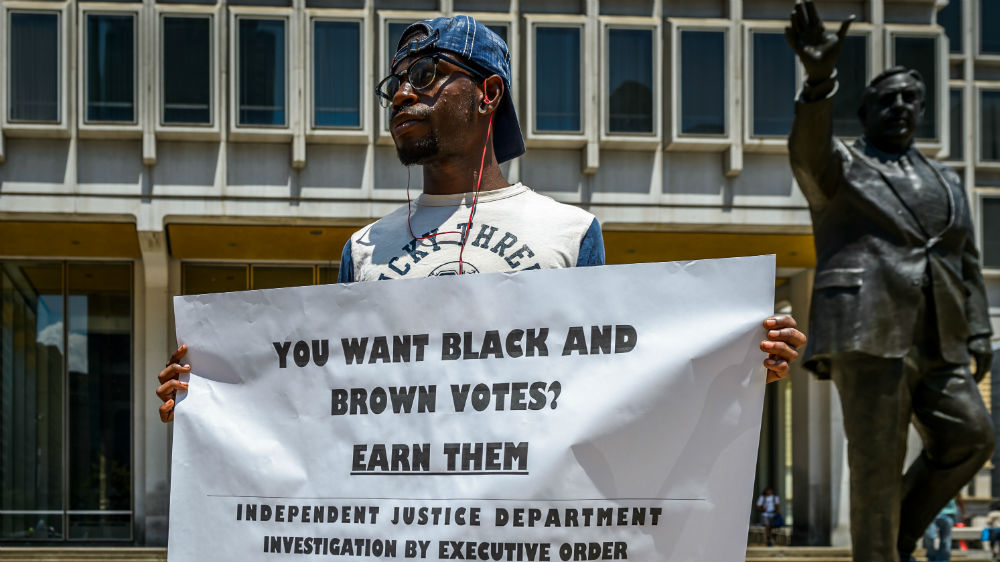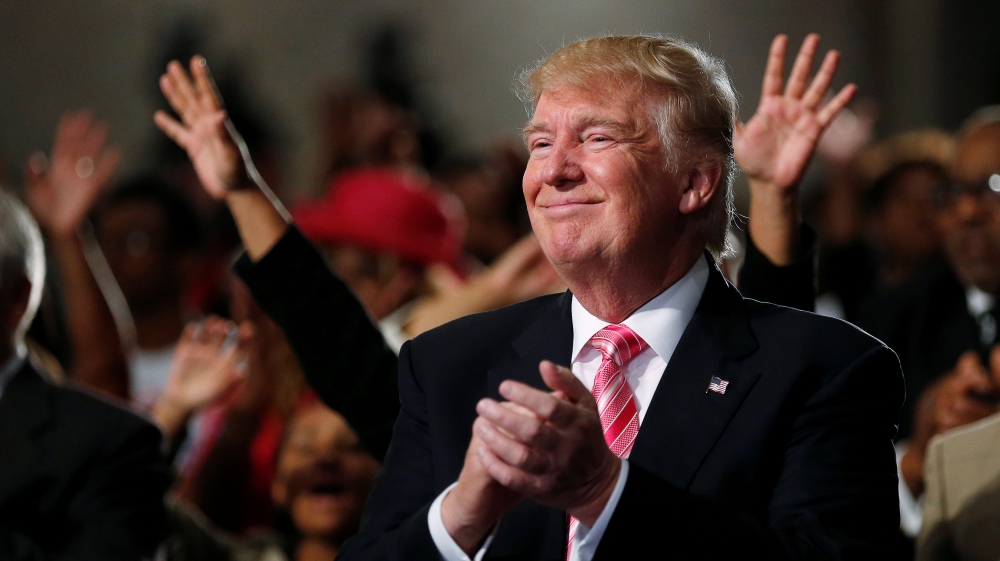loyola llothta
☭☭☭

New York, United States - In the 11th hour of the presidential campaign, the candidates, criss-crossing the crucial swing states, both appealed to the same voting group: African Americans.
Hillary Clinton, speaking in a Northwest Philadelphia church on Sunday, told black voters that the election is a choice between "hope and fear".
"This election is about doing everything we can to stop a movement to destroy President Obama's legacy," she said.
Her campaign is seeking to boost turnout of African-American voters, which has slipped since they voted in record numbers to elect Barack Obama in 2008 and 2012.
According to a November 2 aggregation of five national polls, Clinton commands 83.3 percent of the black vote, against Trump's 4.3 percent.
The numbers did not discourage Trump from making a last appeal to African Americans in Florida on Saturday, asking them to vote for him with the question: "What the hell do you have to lose?"
The Trump outreach
Throughout his campaign, Trump's outreach to black voters has focused on the need for tough law enforcement as he has described African-American neighbourhoods as "ghettos" overwhelmed by crime and poverty.
Dominic Carter has been covering politics in New York and nationally for more than 30 years. He says Trump's overtures to the African-American community are not only failing, but are actually backfiring.
If anything, he says the rhetoric will make voters come out for Clinton. "Him connecting with communities of colour is never going to happen."
One reason, Carter says, is Trump's refusal to recognise the innocence of the Central Park Five, despite the DNA evidence that exonerated them. The African-American teenagers were accused, then convicted of raping and savagely beating a woman jogging in Central Park in 1989.
They confessed after 43 hours of questioning and Trump called for the death penalty for them.
The confessions were later found to be coerced, and the real rapist confessed. Yet, just weeks ago, Trump still insisted they were guilty.

Trump has pledged to make America's inner cities better for the African-American citizens [Reuters]
Another element of Trump's "law and order" campaign, brought up as tension flared over police shootings of black men in September, is his intention to bring back the "stop-and-frisk" policy.
"We did it in New York, and it worked incredibly well," he said of the practice that was criticised for unfairly targeting African Americans and Latinos.
"To refer to a policy that has been deemed unconstitutional shows a lack of knowledge and concern for a significant portion of the country," Arva Rice, president of the New York Urban League, a civil rights group, says.
Stop-and-frisk first came under intense scrutiny in 1999, in the aftermath of the police shooting of Amadou Diallo, an unarmed Guinean immigrant, outside of his apartment in the Bronx.
"Stop-and-frisk was the direct result that caused my son's death," his mother, Kadiatou Diallo, told Al Jazeera.
The 23-year-old street vendor was shot and killed by two plain-clothes police officers on his way home while reaching for his wallet inside his coat. The cops opened fire, shooting 42 times, hitting Diallo 19 times. He died holding his wallet.
READ MORE: Understanding racism in the US
The death of the son Kadiatou Diallo describes as "sweet and loving" started a movement, bringing attention to the issue of black deaths at the hands of police.
"People were coming out saying, 'it could have been me'. Parents were worried about their sons. It was really a defining moment for the community and the city," she says.
While there is no official US database tracking police shootings, there are independent studies and lists. A University of California study, for instance, shows the probability of being black, unarmed and shot by police is 3.49 times the probability of being white, unarmed and shot by police.
A study conducted by The Guardian, shows that, in 2015 alone, black men were nine times more likely to be killed by police than white men.

Activists have urged Clinton to work on having police killings stopped to deserve their votes [Getty Images]
A Clinton appeal
Clinton has responded to the shootings by acknowledging racial injustice in the justice system and calling for investment in training of the police, but, still faces challenges in convincing African American voters.
Taina Traverso, an artist and community activist, has lived in East Harlem’s public housing projects for 30 years. Originally a Bernie Sanders supporter, she says that she finds it hard to support Clinton for one reason: the 1994 Violent Crime Control and Law Enforcement Act, commonly called the Clinton Crime Bill, backed by Bill Clinton and passed with a bi-partisan vote.
"So many of our young men were incarcerated because of that bill," she says. "An entire generation was lost."
The bill contained a controversial "three strikes" rule, which said that a third felony arrest, no matter what the crime, could, and often did, result in a life sentence.
But some leaders in the African-American community say anger over the past is not nearly as important as defeating Trump and electing Clinton.
Dr Hazel Dukes, president of the New York State chapter of the National Association for the Advancement of Colored People and a civil rights activist since the 1960s, says she is sure black voters will turn out for Clinton.
"Bill Clinton is not running for president," she says. "The candidates are Donald Trump and Hillary Clinton. And Donald Trump has never done anything for the African-American community. We have been insulted and disrespected."
She specifically refers to the "birther" lie, Trump's insistence that Obama was not born in the US, therefore not eligible to be president.
"That's a real hot spot in the community. Yes, we get very upset about that. Very upset," Dukes said.
Kadiatou Diallo, who is an American citizen now, says that she will be voting for Clinton.
"Hillary Clinton resonates with me," Diallo says, "because, when my son's case was up, she came out and supported me. She's speaking with messages that give us hope, and I'm looking forward to calling her Madame President."
WATCH: Black Lives Matter - What has the movement achieved? (9:37)
The disengaged youth
But there is a new generation of African-American voters, millennials who are not tied to the past, or, even, to a single issue.
Kristian Davis Bailey, 24, is a Detroit-based member of the Black Youth Party 100, which works closely with the Movement for Black Lives. He says he will not be voting for either presidential candidate.
"To be honest, I've intentionally disengaged from this election cycle," he says. In part, he blames his disenchantment on the Obama administration.
"The issues of people being killed by police or being locked behind bars has either continued or escalated," he says, "with little meaningful action from our first African-American president."
But, he says, millennials, like him, are not one-issue voters.
"When you look outside just black issues," he says, "you're either still participating in or investing in wars abroad, and they're still locking up millions of our citizens. Either candidate is still going to continue bombing Muslim countries."
Clinton and Trump fail to impress black voters

